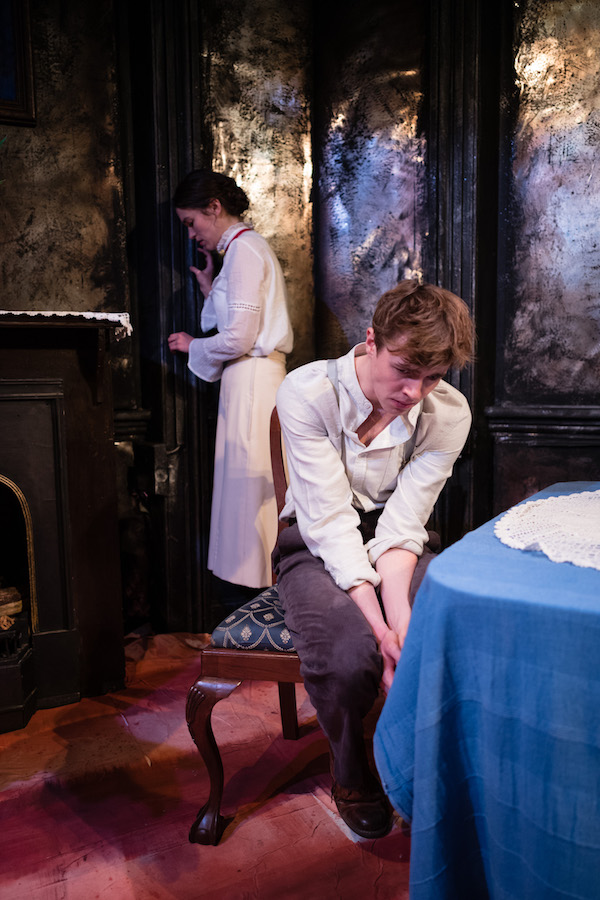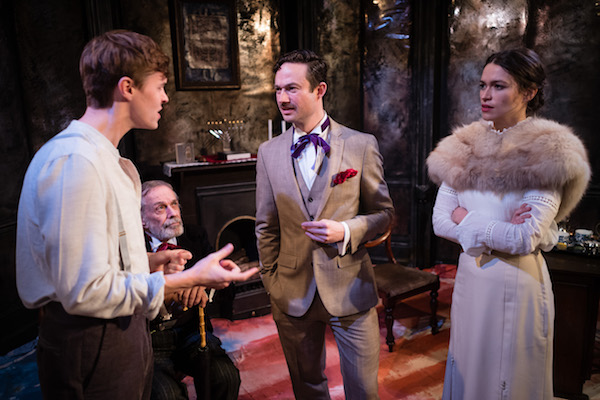The Melting Pot, Finborough Theatre review - entertaining morals | reviews, news & interviews
The Melting Pot, Finborough Theatre review - entertaining morals
The Melting Pot, Finborough Theatre review - entertaining morals
New York refugee drama confronts anti-semitism with humour and heart

Israel Zangwill’s 1908 play The Melting Pot characterises Europe as an old and worn-out continent racked by violence and injustice and in thrall to its own bloody past. America, on the other hand, represents a visionary project that will “melt up all race-difference and vendettas” to “purge and recreate” a new world.
Mendel Quixano, played by Peter Marinker, is a Jewish musician and New York immigrant. A little too old to devote himself to the aspirations America inspires in his youthful pogrom-surviving composer nephew David (Steffan Cennydd), he lives with his gripey Yiddish-speaking mother Frau Quixano (Ann Queensbury) and ekes out a living as a piano tutor. His cynicism, an evident product of the scant opportunities available to him as an educated immigrant of a certain age, is worn with genial humour and alleviated somewhat by pleasurable little hypocrisies such as breaking the Shabbos to go dancing. Enter Vera Revendal (Whoopie van Ramm), a beautiful young revolutionary aristocrat who has fled Tsarist Russia and now runs a shelter for refugees (but not Jews). She is looking to coax David into performing again for her charges because he is a great musician, and – unaware that he is Jewish – she is more than a little besotted. The stage is set, the questions posed. Will David and Vera’s love overcome the prejudices and obstacles that stand between them? Will David’s musical genius be recognised? Is America the land of opportunity and dreams, or the end of the line for the world’s broken and dispossessed?
 This production by Bitter Pill makes some judicious cuts to Zangwill’s cast and script, and Zangwill himself is introduced as a narrator to set each scene. In part this is because the Finborough is an intimate stage lacking the technical wizardry of a larger theatre – but whether the experience of a traumatic memory or a New York rooftop, sound and lighting by Piers Sherwood-Roberts and Ben Jacobs convincingly convey a sense of place, and Allegra Fitzherbert’s understated set deploys careful details to distinguish between households separated by culture, class and economic security. Worth mentioning, too, is a neat trick that has Peter Marinker playing three roles: Zangwill, Mendel and Vera’s father, the Baron Revendal. Both the Baron and Mendel succumb to the whims of their own prejudices; Zangwill points the way to overcoming hatreds ranging from mild to murderous.
This production by Bitter Pill makes some judicious cuts to Zangwill’s cast and script, and Zangwill himself is introduced as a narrator to set each scene. In part this is because the Finborough is an intimate stage lacking the technical wizardry of a larger theatre – but whether the experience of a traumatic memory or a New York rooftop, sound and lighting by Piers Sherwood-Roberts and Ben Jacobs convincingly convey a sense of place, and Allegra Fitzherbert’s understated set deploys careful details to distinguish between households separated by culture, class and economic security. Worth mentioning, too, is a neat trick that has Peter Marinker playing three roles: Zangwill, Mendel and Vera’s father, the Baron Revendal. Both the Baron and Mendel succumb to the whims of their own prejudices; Zangwill points the way to overcoming hatreds ranging from mild to murderous.
As the star-crossed couple, Vera and David (pictured above) are the play's moral compass. Cannydd and van Raam make valiant efforts but there’s a brittleness to their performances, as if they can’t quite get to the emotions packed within the pieties. Where Cannydd’s David is more monosentimental, so to speak, than monomaniacal, Vera’s world-weary wit and sardonic imitation of the aristocratic mores she abandoned in Russia get lost in van Raam’s earnest delivery and pat come-backs. Both performers come alive playing the nuances and extremes suffered by desperate lovers, but for the most part they seem disinclined to grapple with the darker side of the fervent hopes suffered by – and extolled to – the new generation of self-proclaimed Americans who are old enough to remember Europe, yet young enough to cherish hope.
Weirdly though, this hardly detracts from the show because it's a top-dollar production which deserves a bigger stage. A less intimate setting would aerate the production’s few unevennesses and since we expect impossible love to become possible (and vice versa), goodness doesn’t need much depth to carry an audience along. What is rewarding about Zangwill’s writing and Max Elton’s direction are the pains taken to cast gentle humour on petty bigotries and to humanise (though not excuse) the most reprehensible of characters – mass murderers are people after all.
Take the crisis point, a stand-off between Vera’s father, the Baron, and her fiancé David. David has recognised the Baron as the commander of the pogrom which killed his family. Suddenly their union seems impossible, washed by waves of blood. The Baron threatens David with a pistol; then, even more terribly, he hands him the gun. Here, Elton’s direction sings. Cennydd’s David stands, his shaking back to the audience, hunched by grief and rage, his anguish private, inaccessible. And so it is Marinker’s Baron upon whom this high drama pivots. He looks out over the audience, and we clearly see the brutish masculine challenge, we sense his yearning for oblivion now his daughter is lost to him, we see his disappointment when David, shot through with fatigue, returns the pistol to him. The justice meted out to the Baron isn’t the old world’s vengeance, it is the justness of living with the realisation of having blood-dipped hands that have lost forever the person he loves most in the world. And for a moment we have sympathised with a murderer. What, we must ask ourselves, are the things a human crucible never can – nor should – purify?
The rest of the cast are pitch-perfect. Hayward B Morse’s conductor Herr Pappelmeister is played with impish superciliousness, Ann Queensbury as Frau Quixano is an endearing biddie whose despairs and enthusiasms meet with natural humour, Alexander Gatehouse’s Davenport is the smarmy embodiment of inherited millions (all that's missing is the blonde comb-over and tan), and Katrina McKeever as Irish maid Kathleen threatens to steal the show with incorrigible bombast and fair-wind pronouncements.
Yes, it’s moralising, but it’s hugely entertaining. Go see it.
rating
Share this article
The future of Arts Journalism
You can stop theartsdesk.com closing!
We urgently need financing to survive. Our fundraising drive has thus far raised £49,000 but we need to reach £100,000 or we will be forced to close. Please contribute here: https://gofund.me/c3f6033d
And if you can forward this information to anyone who might assist, we’d be grateful.

Subscribe to theartsdesk.com
Thank you for continuing to read our work on theartsdesk.com. For unlimited access to every article in its entirety, including our archive of more than 15,000 pieces, we're asking for £5 per month or £40 per year. We feel it's a very good deal, and hope you do too.
To take a subscription now simply click here.
And if you're looking for that extra gift for a friend or family member, why not treat them to a theartsdesk.com gift subscription?
more Theatre
 Macbeth, RSC, Stratford review - Glaswegian gangs and ghoulies prove gripping
Sam Heughan's Macbeth cannot quite find a home in a mobster pub
Macbeth, RSC, Stratford review - Glaswegian gangs and ghoulies prove gripping
Sam Heughan's Macbeth cannot quite find a home in a mobster pub
 The Line of Beauty, Almeida Theatre review - the 80s revisited in theatrically ravishing form
Alan Hollinghurst novel is cunningly filleted, very finely acted
The Line of Beauty, Almeida Theatre review - the 80s revisited in theatrically ravishing form
Alan Hollinghurst novel is cunningly filleted, very finely acted
 Wendy & Peter Pan, Barbican Theatre review - mixed bag of panto and comic play, turned up to 11
The RSC adaptation is aimed at children, though all will thrill to its spectacle
Wendy & Peter Pan, Barbican Theatre review - mixed bag of panto and comic play, turned up to 11
The RSC adaptation is aimed at children, though all will thrill to its spectacle
 Hedda, Orange Tree Theatre review - a monument reimagined, perhaps even improved
Scandinavian masterpiece transplanted into a London reeling from the ravages of war
Hedda, Orange Tree Theatre review - a monument reimagined, perhaps even improved
Scandinavian masterpiece transplanted into a London reeling from the ravages of war
 The Assembled Parties, Hampstead review - a rarity, a well-made play delivered straight
Witty but poignant tribute to the strength of family ties as all around disintegrates
The Assembled Parties, Hampstead review - a rarity, a well-made play delivered straight
Witty but poignant tribute to the strength of family ties as all around disintegrates
 Mary Page Marlowe, Old Vic review - a starry portrait of a splintered life
Tracy Letts's Off Broadway play makes a shimmeringly powerful London debut
Mary Page Marlowe, Old Vic review - a starry portrait of a splintered life
Tracy Letts's Off Broadway play makes a shimmeringly powerful London debut
 Little Brother, Soho Theatre review - light, bright but emotionally true
This Verity Bargate Award-winning dramedy is entertaining as well as thought provoking
Little Brother, Soho Theatre review - light, bright but emotionally true
This Verity Bargate Award-winning dramedy is entertaining as well as thought provoking
 The Unbelievers, Royal Court Theatre - grimly compelling, powerfully performed
Nick Payne's new play is amongst his best
The Unbelievers, Royal Court Theatre - grimly compelling, powerfully performed
Nick Payne's new play is amongst his best
 The Maids, Donmar Warehouse review - vibrant cast lost in a spectacular-looking fever dream
Kip Williams revises Genet, with little gained in the update except eye-popping visuals
The Maids, Donmar Warehouse review - vibrant cast lost in a spectacular-looking fever dream
Kip Williams revises Genet, with little gained in the update except eye-popping visuals
 Ragdoll, Jermyn Street Theatre review - compelling and emotionally truthful
Katherine Moar returns with a Patty Hearst-inspired follow up to her debut hit 'Farm Hall'
Ragdoll, Jermyn Street Theatre review - compelling and emotionally truthful
Katherine Moar returns with a Patty Hearst-inspired follow up to her debut hit 'Farm Hall'
 Troilus and Cressida, Globe Theatre review - a 'problem play' with added problems
Raucous and carnivalesque, but also ugly and incomprehensible
Troilus and Cressida, Globe Theatre review - a 'problem play' with added problems
Raucous and carnivalesque, but also ugly and incomprehensible
 Clarkston, Trafalgar Theatre review - two lads on a road to nowhere
Netflix star, Joe Locke, is the selling point of a production that needs one
Clarkston, Trafalgar Theatre review - two lads on a road to nowhere
Netflix star, Joe Locke, is the selling point of a production that needs one

Add comment